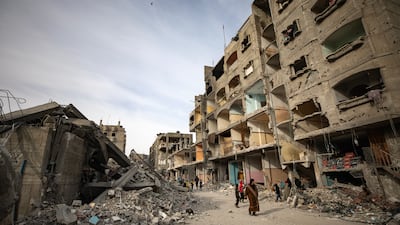At least 103 people were killed in Israeli strikes in Gaza overnight and many others are believed to be trapped under the rubble, the enclave's Health Ministry said on Saturday.
More than 29,600 people have been killed and 69,737 injured since the conflict began on October 7.
The ministry reported at least 10 attacks against families in Gaza that also resulted in 160 injuries in the past 24 hours.
On Saturday, an Israeli military helicopter fired towards houses in the east of Abasan Al-Kabeer and dropped projectiles on the town of Khaza'a, east of Khan Younis.
Several of the injured were brought to Shuhada Hospital in Gaza city after an Israeli air strike targeted civilian homes in the Deir al-Balah area in central Gaza. The residence of well-known Palestinian comedian Mahmoud Za'tar was destroyed in the strikes.
“I was against the idea of leaving Gaza, because I love Gaza and I don’t want to leave it, but they are forcing us to leave Gaza looking for safety,” Mr Za'tar said.
The strikes come as mediators met in Paris on Friday to begin talks on pausing the war in Gaza and enacting a prisoner and hostage swap between Israel and Hamas, the latest push by the US, Egypt and Qatar to end the conflict.
Israel's spy chief was in Paris to take part in the talks.
Fears for civilians in the Gaza Strip are deepening, with the UN warning of the growing risk of famine and its main aid body for Palestinians, the UN Relief and Works Agency for Palestine Refugees in the Near East, saying on Saturday that Gazans were “in extreme peril while the world watches on”.
“No one can claim “I did not know” as the images, footage and voices of unspeakable suffering continue,” the UNRWA said on X.
“We cannot turn a blind eye to this human tragedy any longer.”
The Ministry of Health spokesman, Ashraf al-Qidra, said that 22 people were killed and 50 were injured as a result of the bombing of Za'tar's house.
Mr Al-Qidra also confirmed that the Israeli forces continue to remain around the Nasser Medical Complex and the Hope Hospital in Khan Younis.
On Friday, the UN humanitarian agency OCHA said: “Without adequate food and water supplies, as well as health and nutrition services, the elevated risk of famine in Gaza is projected to increase.”
Gaza's Health Ministry said the Israeli army released three medical staff who were arrested while on duty at Nasser Medical Complex, but dozens are still detained.
The Red Crescent in Gaza said that there is a significant decline in the number of humanitarian aid lorries entering through the Rafah border crossing.
During Hamas' October 7 attack on southern Israel, militants killed about 1,200 people and took 250 hostages.
About half of the hostages were released during a week-long ceasefire in November. About 100 hostages remain in captivity.
To date, Israeli military bombardment of Gaza has killed more than 29,600 Palestinians and displaced about 85 per cent of the enclave’s 2.3 million residents.
Israeli Prime Minister Benjamin Netanyahu has presented a plan to his right-wing cabinet that said reconstruction in the devastated Gaza Strip should not commence until full demilitarisation is achieved, according to an official document seen by The National.
The two-page document, titled The Day After Hamas, shows the Israeli Prime Minister’s stringent vision for Gaza's future, including a series of challenging preconditions for the territory's rehabilitation after months of relentless bombing.
Mr Netanyahu's plan also calls for the closure of the UNRWA, the establishment of a security zone along Gaza's border, and sustained military autonomy over the long term.
“Rehabilitation of the strip will be possible only after the completion of demilitarisation and the beginning of the deradicalisation process,” said the document.
“The rehabilitation programme will be carried out with funding and leadership by countries accepted by Israel,” it added.




















